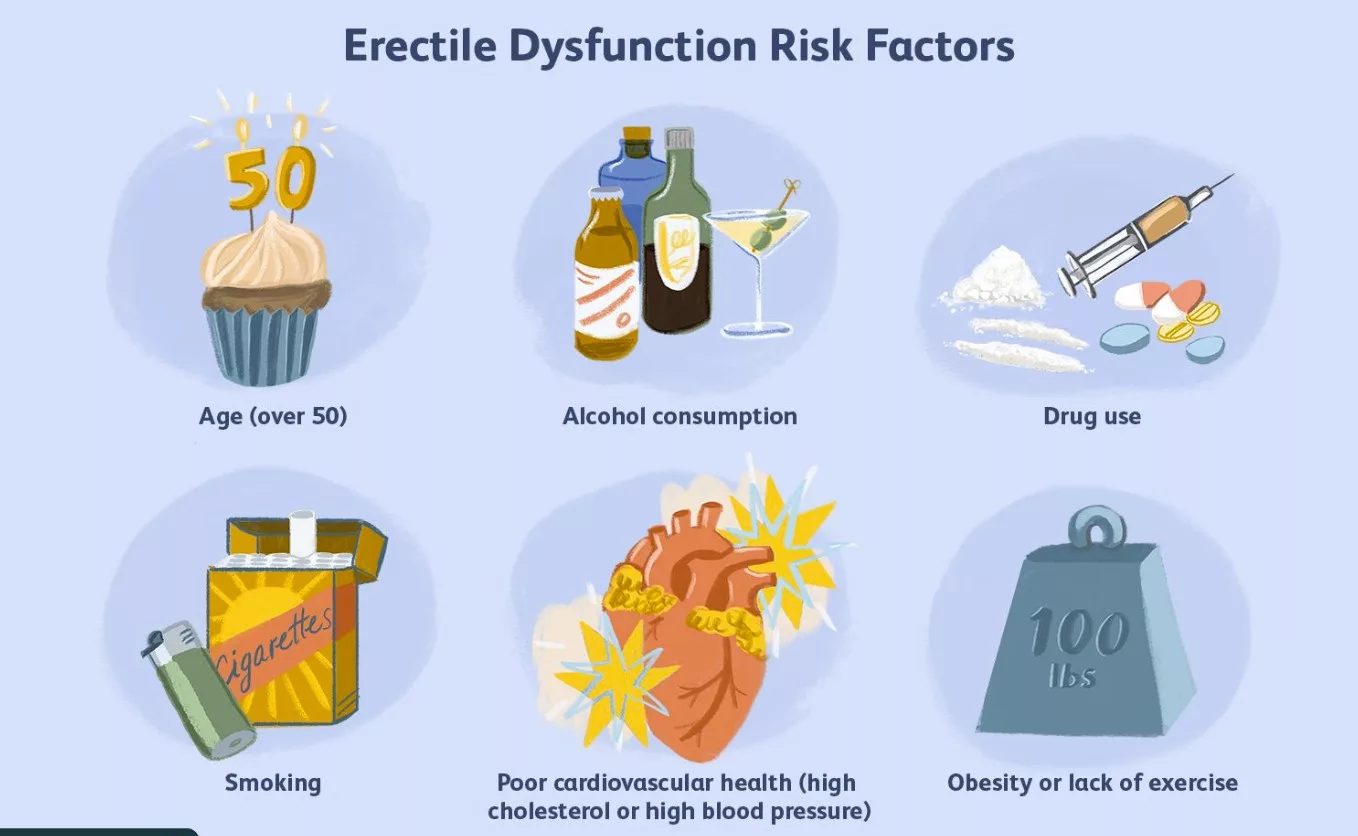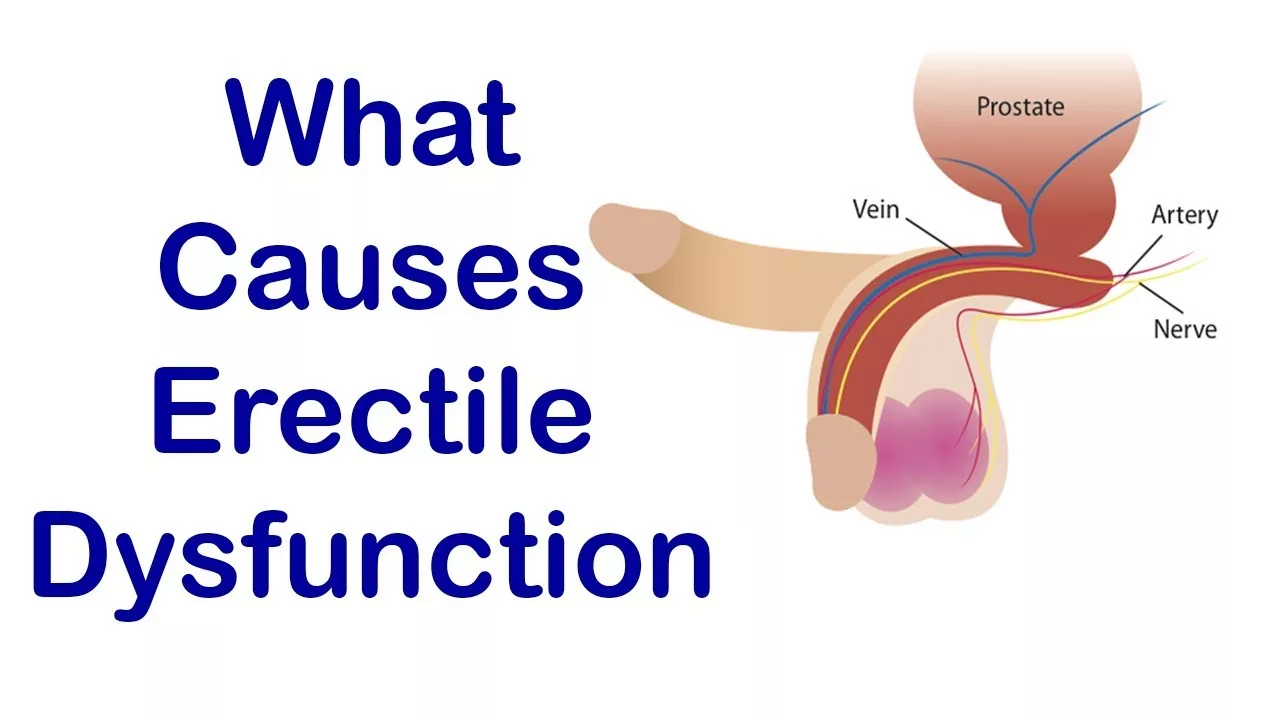Causes of Erectile Dysfunction (ED)
Erectile Dysfunction | ED Treatment | Shockwave Therapy for ED
In this blog post, we will discuss what causes erectile dysfunction including physical, psychological, and lifestyle factors leading to ED. Erectile dysfunction (ED) is a common condition that affects many men worldwide. It is characterized by the inability to achieve or maintain an erection firm enough for sexual intercourse. Estimates suggest that one of every 10 men will suffer from ED at some point during his lifetime. It is important to understand that in most cases, ED is a symptom of another, underlying problem. ED is not considered normal at any age, and may be associated with other problems that interfere with sexual intercourse, such as lack of desire and problems with orgasm and ejaculation. Having erection trouble from time to time isn’t necessarily a cause for concern.
If erectile dysfunction is an ongoing issue, however, it can cause stress, affect your self-confidence and contribute to relationship problems. Problems getting or keeping an erection can also be a sign of an underlying health condition that needs treatment and a risk factor for heart disease. ED can have a significant impact on a man’s quality of life and can lead to feelings of frustration, anxiety, and depression.
Physical Causes of Erectile Dysfunction

-
Cardiovascular Disease
Cardiovascular disease is a common cause of ED. It’s a group of conditions that affect the heart and blood vessels, including atherosclerosis, hypertension, and peripheral arterial disease. Atherosclerosis is the buildup of plaque in the arteries, which can restrict blood flow to the penis. Hypertension, or high blood pressure, can also restrict blood flow to the penis, making it difficult to achieve or maintain an erection. Peripheral arterial disease is a condition in which the blood vessels that supply blood to the legs and feet become narrow or blocked, which can also affect blood flow to the penis.
-
Diabetes
Diabetes is another common cause of ED. High blood sugar levels can damage blood vessels and nerves throughout the body, including those that supply blood to the penis. Over time, this damage can lead to ED.
-
Obesity
Obesity is a risk factor for many health conditions, including ED. Excess weight can contribute to ED by reducing testosterone levels and restricting blood flow to the penis. Obesity is also associated with a higher risk of developing other conditions that can contribute to ED, such as diabetes and cardiovascular disease.
Call to Book your FREE Consultation
-
Low Testosterone
Testosterone is a hormone that plays a crucial role in sexual function. Low testosterone levels can contribute to ED by reducing libido and affecting the ability to achieve or maintain an erection.
-
Medications
Certain medications can cause ED. These include antidepressants, antihistamines, and blood pressure drugs. If you’re experiencing ED and are taking medication, talk to your healthcare provider about the possibility of switching to a different medication.
-
Neurological Disorders
Neurological disorders, such as Parkinson’s disease, multiple sclerosis, and spinal cord injuries, can affect the nerves that control erections. These conditions can also affect blood flow to the penis, making it difficult to achieve or maintain an erection.
-
Peyronie’s Disease
Peyronie’s disease is a condition in which scar tissue develops in the penis, causing it to curve. This can make it difficult or painful to achieve or maintain an erection.
Psychological Causes of Erectile Dysfunction

-
Stress
Stress can affect sexual performance by reducing libido and causing anxiety. When a man is stressed, his body produces cortisol, a hormone that can affect sexual function.
-
Anxiety
Anxiety can affect sexual function by causing nervousness and performance anxiety. This can make it difficult for a man to achieve or maintain an erection.
-
Depression
Depression can affect sexual function by reducing libido and causing fatigue. When a man is depressed, he may lose interest in sex and find it difficult to become aroused.
Make an Appointment Now!
-
Relationship Problems
Relationship problems, such as communication issues and conflicts, can affect sexual function. When a man is experiencing relationship problems, he may find it difficult to become aroused or maintain an erection.
Lifestyle Factors that Contribute to Erectile Dysfunction

-
Smoking
Smoking is a significant risk factor for ED. Smoking can damage blood vessels, reducing blood flow to the penis, and can also reduce the effectiveness of medications used to treat ED. Nicotine can also cause a decrease in testosterone levels, which can further contribute to ED. Quitting smoking can help improve sexual function and overall health.
-
Excessive Alcohol Consumption
Excessive alcohol consumption can also impair sexual function. Alcohol can reduce libido and affect the ability to achieve or maintain an erection. Alcohol can also interfere with the effectiveness of medications used to treat Erectile Dysfunction. Moderation is key when it comes to alcohol consumption, and limiting your intake can help improve your sexual function.
-
Lack of Exercise
Lack of exercise can contribute to ED by reducing blood flow to the penis and reducing testosterone levels. Exercise can help improve overall health and sexual function. Aerobic exercise, such as running or cycling, can help improve blood flow to the penis, while resistance training can help increase testosterone levels.
-
Poor Diet
A diet high in processed foods and low in fruits and vegetables can contribute to ED by reducing blood flow to the penis and increasing the risk of developing other conditions that can contribute to ED, such as diabetes and cardiovascular disease. A healthy diet that includes plenty of fruits, vegetables, whole grains, lean protein, and healthy fats can help improve sexual function and overall health.
-
Drug Use
The use of recreational drugs, such as cocaine and marijuana, can also contribute to ED. Recreational drugs can cause damage to the blood vessels and nerves that are essential for sexual function, making it difficult to achieve or maintain an erection. If you’re experiencing ED and are using recreational drugs, it’s important to talk to your healthcare provider about the possible impact of these drugs on your sexual function.
Find Best Treatment for Erectile Dysfunction in Dallas, TX

Call Us Today +1-888-816-9362
Moreover, we have created a setting where you can seek treatment for erectile dysfunction without fear or shame because we recognize the physical and emotional sensitivity of the condition. If you have any questions, do not hesitate to contact us anytime. We are always here to help you out.
If you have any questions, do not hesitate to contact us anytime. We are always here to help you out.
Can a man overcome erectile dysfunction?
n many cases, yes, erectile dysfunction can be reversed. A study published in the Journal of Sexual Medicine found a remission rate of 29 percent after 5 years. It is important to note that even when ED cannot be cured, the right treatment can reduce or eliminate symptoms.
What causes weak erection?
Physical issues like heart disease, high cholesterol, high blood pressure, diabetes, obesity, and smoking can all cause erectile dysfunction. On the other hand, depression, anxieties, stress, relationship problems, and other mental health concerns can also interfere with sexual feelings.
Can ED recover naturally?
A study published in May 2014 in The Journal of Sexual Medicine found that some men can reverse erectile dysfunction with healthy lifestyle changes, such as exercise, weight loss, a varied diet, and good sleep.

